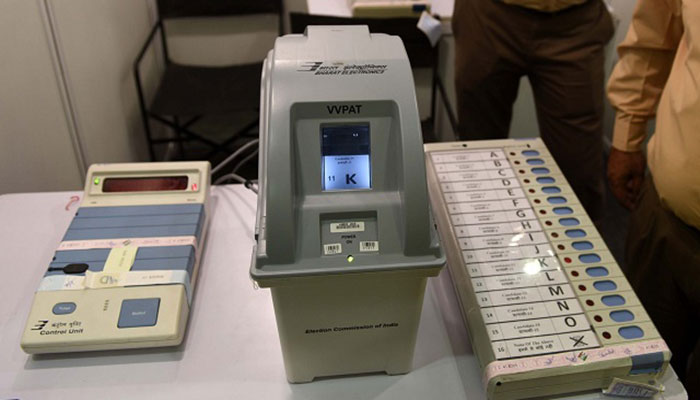Electronic voting: Fafen for consensus to amend electoral laws
ISLAMABAD: Expressing its position on electronic voting machines (EVMs) and I-Voting, the Free and Fair Election Network (Fafen) said Friday any amendment to the election laws should be made through a political consensus, not just through a majority vote.
The network maintained that any amendment through a majority vote would being into question the legitimacy of any future election and would be counterproductive. The network stated: The amendment allows the Election Commission of Pakistan (ECP) procurement of Electronic Voting Machines for casting of votes in general elections without detailed consideration of its legal, regulatory and administrative impacts.
2. The choice of technology and type of machines to be acquired have been left to the ECP but without a qualification that the technology/machines to be procured should fully respond to the existing provisions of the Elections Act, 2017 viz-a-viz voting and counting processes as provided for in sections 84, 85, 86, 87, 88, 89 and 90.
3. The election law should not be amended to suit the limitations of technology/machines to be procured and neither should the voting and counting provisions as contained under sections 84, 85, 86, 87, 88, 89 and 90 be altered through changes in the rules. Such legal scheme may compromise the parliamentary authority over legislation.
4. The amendment is also unclear on whether ECP can procure technology/machines that include facility of voter authentication and verification as provided for in 84(2) of the Elections Act, 2021. Such technology/machines can compromise the voter secrecy and a voter’s choice may be tracked.
The amendment requires ECP to enable overseas Pakistanis to exercise their right to vote in their country of residence only during general elections through any means developed with the assistance from NADRA or any other authority or agency. The amendment clearly reflects the intention of government that an IT-based system be developed for the purpose.
The amendment lacks on critical questions pertaining to voting by overseas Pakistanis including:
a. Responsibility of determination of qualification for overseas voters as provided under Section 94(2) of the Elections Act, 2017;
b. Responsibility of their registration as voters and allocation to the constituency i.e. their choice or their permanent address on NICOP;
c. Mechanism for ECP to enforce the legal requirement as provided for under Sections 30 (claims and objections) and Sections 37 (verification); Mechanism for provisions of electoral rolls to candidates as provided under Section 41 (2) which only contains the addresses of voters where their vote is registered, but in this case the voters are not residing on those addresses;
d. Provisions pertaining to campaigning and expense limits by candidates;
e. Verification and authentication of voters on election day as required under Section 84 (1) of the Elections Act, 2017;
f. Counting of overseas votes at the time of provisional or consolidation of results;
g. Voting time for overseas Pakistanis has not been defined. If it involved early voting procedures, legal changes may be required or otherwise the overseas voting may have to be qualified as postal balloting and be treated as such;
h. Treatment of list of overseas voters –one list at the constituency level or marked off at the level of electoral rolls provided at the polling stations just as in case of postal ballots issued;
i. Candidate oversight over casting of overseas votes i.e. 9.5 million potential voters.
-
 Emma Roberts Stars In 'A Body In The Woods'
Emma Roberts Stars In 'A Body In The Woods' -
 'Our Estrangements Can Kill Us': Meghan's Co-star Weighs In On Anthony Hopkins Interview
'Our Estrangements Can Kill Us': Meghan's Co-star Weighs In On Anthony Hopkins Interview -
 ‘Tone Deaf’ Andrew Called Out Over Arrogant Behaviour Amid Epstein Scandal
‘Tone Deaf’ Andrew Called Out Over Arrogant Behaviour Amid Epstein Scandal -
 Singing, Dancing & Outperforming: Watch China’s Robot Fair Ahead Of Spring Festival 2026
Singing, Dancing & Outperforming: Watch China’s Robot Fair Ahead Of Spring Festival 2026 -
 WhatsApp Under Fire: EU Steps Up Pressure On Meta Over Claims Of Blocking AI Rivals
WhatsApp Under Fire: EU Steps Up Pressure On Meta Over Claims Of Blocking AI Rivals -
 Steven Van Zandt Criticizes Bad Bunny's 2026 Super Bowl Performance
Steven Van Zandt Criticizes Bad Bunny's 2026 Super Bowl Performance -
 Katie Price Seen With New Hubby Lee Andrews Weeks After Tying The Knot
Katie Price Seen With New Hubby Lee Andrews Weeks After Tying The Knot -
 Biggest Order Yet Issued Against Andrew Mountbatten-Windsor: King Charles You Have To’
Biggest Order Yet Issued Against Andrew Mountbatten-Windsor: King Charles You Have To’ -
 ByteDance’s Seedance 2.0 Marks New Era Of Cinematic AI-generated Videos: Here’s How
ByteDance’s Seedance 2.0 Marks New Era Of Cinematic AI-generated Videos: Here’s How -
 Struggling With Obesity? Here's How To Manage It
Struggling With Obesity? Here's How To Manage It -
 How Epstein Scandals Are Impacting King Charles’ Healing As Stress Refuses To Relent: ‘Could Spell His End’
How Epstein Scandals Are Impacting King Charles’ Healing As Stress Refuses To Relent: ‘Could Spell His End’ -
 Why Prince William Releases Statement On Epstein Scandal Amid Most 'challenging' Diplomatic Trip?
Why Prince William Releases Statement On Epstein Scandal Amid Most 'challenging' Diplomatic Trip? -
 Ciara, Russell Wilson Become Matchmakers For Pals?
Ciara, Russell Wilson Become Matchmakers For Pals? -
 Historic Mental Health Facility Closes Its Doors
Historic Mental Health Facility Closes Its Doors -
 Top 5 Easy Hair Fall Remedies For The Winter
Top 5 Easy Hair Fall Remedies For The Winter -
 Japan Elections: Stock Surges Record High As PM Sanae Takaichi Secures Historic Victory
Japan Elections: Stock Surges Record High As PM Sanae Takaichi Secures Historic Victory




